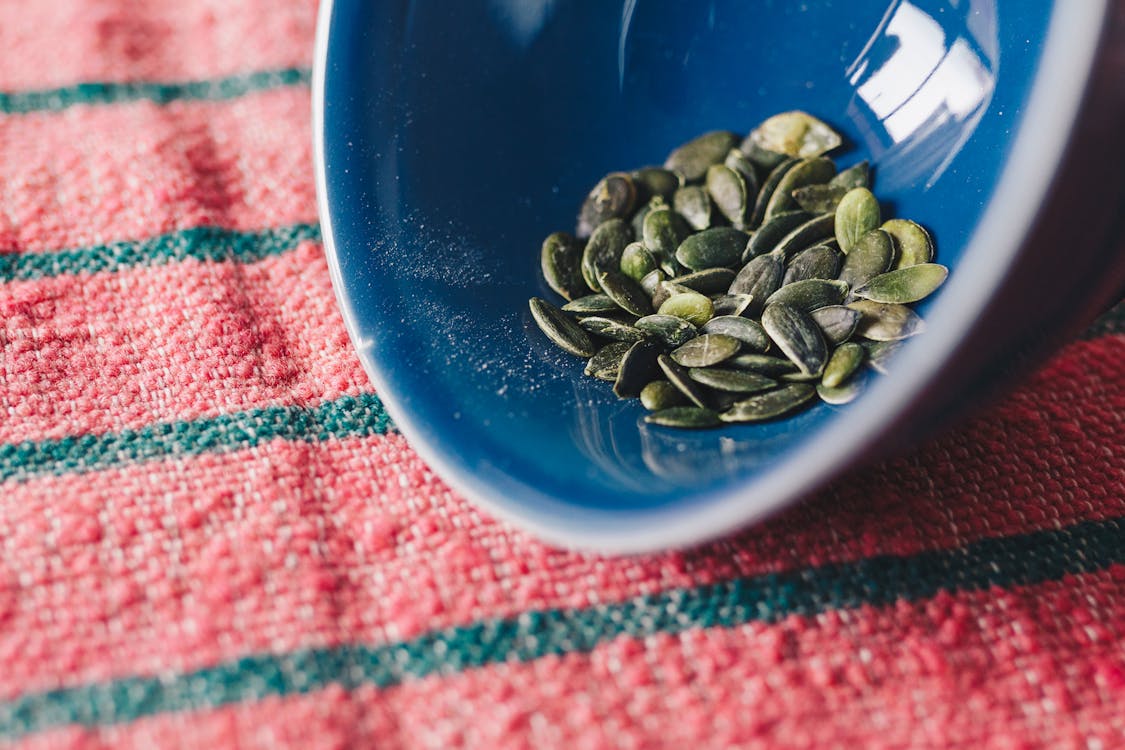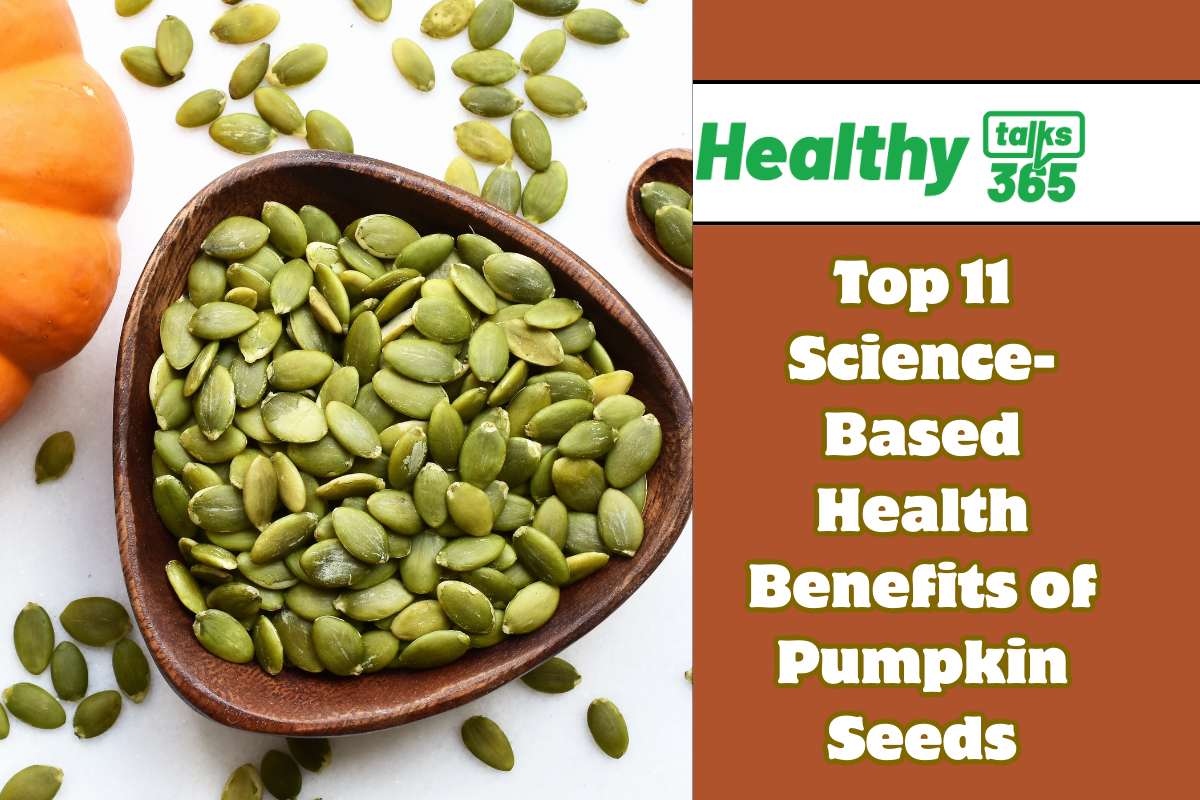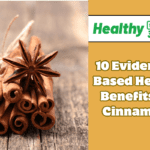Top 11 Science-Based Health Benefits of Pumpkin Seeds
1. Pumpkin seeds are rich in Nutrients
Pumpkin seeds are packed with nutrients that are good for you. They contain things like magnesium, zinc, iron, and vitamin K, which help keep your body healthy. They also have antioxidants that protect your cells from damage.
Plus, they’re full of healthy fats, fiber, and protein, which can help you feel full and manage your weight. Adding pumpkin seeds to your diet is an easy way to get these benefits.
You can eat them raw, roasted, or add them to your favorite dishes like salads or soups.

2. Pumpkin seeds contain High Antioxidants
Pumpkin seeds have antioxidants, which are good for you. Antioxidants help protect your body from damage by harmful molecules called free radicals.
These antioxidants in pumpkin seeds, like vitamin E and carotenoids, can keep you healthy. Eating pumpkin seeds is an easy way to get more antioxidants into your diet. You can eat them as a snack or add them to your meals, like salads or yogurt.
Regularly eating foods with antioxidants, such as pumpkin seeds, can help your immune system and prevent diseases.
Read Also:
How To Reduce Your Weight Under 45 Days: Tips And Solutions
3. Pumpkin seeds improve Heart Health
Pumpkin seeds are good for your heart as well. They have nutrients like magnesium and potassium that help keep your heart healthy. The healthy fats in pumpkin seeds can also lower cholesterol and reduce inflammation, which is good for your heart.
Plus, pumpkin seeds have antioxidants that protect your heart from damage. Eating pumpkin seeds as a snack or adding them to your meals, like salads or oatmeal, can help keep your heart strong.
But remember, it’s important to eat a balanced diet and stay active for overall heart health.
4. Pumpkin seeds lower Blood Sugar Levels
Pumpkin seeds might help lower blood sugar levels. They’re have nutrients like magnesium and zinc, which help regulate blood sugar.
Plus, the fiber in pumpkin seeds slows down sugar absorption in your body.
Eating pumpkin seeds as a snack or adding them to meals like salads or yogurt could help keep your blood sugar levels steady.
5. Pumpkin seeds may improve Prostate Health
Pumpkin seeds might be good for your prostate. They have stuff like zinc and antioxidants that could help keep your prostate healthy.
Zinc is important for your prostate because it helps with hormones and your immune system. Antioxidants protect your prostate cells from damage. Eating pumpkin seeds as a snack or adding them to your meals, like salads or soups, could help support your prostate health.
But if you’re worried about your prostate health, it’s a good idea to talk to a doctor.
Read Also:
Best Exercises And Yoga Poses For A Healthy Lifestyle
6. Pumpkin seeds improve Bladder Function
Some people think pumpkin seeds might be good for your bladder. They’re packed with nutrients like magnesium and potassium, which help keep your bladder healthy.
The antioxidants in pumpkin seeds protect your bladder cells from damage. Some believe that the natural oils in pumpkin seeds could also soothe the bladder lining.
But more research is needed to be sure. If you’re thinking about trying pumpkin seeds for your bladder, it’s best to talk to a doctor first.
7. Pumpkin seeds boost Immune System
Some people believe that pumpkin seeds can help your immune system as they have things like zinc and vitamin E that are good for fighting off infections.
Plus, the antioxidants in pumpkin seeds protect your immune cells from damage. While there’s some evidence to support this, more research is needed to be sure.
Eating pumpkin seeds as part of a healthy diet can be one way to support your immune system. But it’s also important to stay active, get enough sleep, and manage stress for overall health.

8. Pumpkin seeds aid in Weight Loss
Pumpkin seeds can help with weight loss. They’re full of protein, healthy fats, and fiber, which can keep you feeling full. Plus, they’re packed with vitamins and minerals but low in calories.
The magnesium in pumpkin seeds might also help control blood sugar levels, which could aid weight management. While pumpkin seeds alone won’t make you lose weight, eating them as part of a healthy diet might help.
But remember, weight loss is different for everyone, so it’s best to talk to a doctor or dietitian for personalized advice.
9. Pumpkin seeds improve Sleep
Eating pumpkin seeds can help you sleep better. They’re full of nutrients like magnesium and tryptophan, which are thought to promote relaxation and improve sleep quality.
Pumpkin seeds contain zinc, which helps your body make melatonin, a hormone that regulates sleep. Eating pumpkin seeds as a snack before bed or adding them to your meals might help you get a better night’s sleep.
But remember, everyone is different, so it’s best to talk to a doctor if you have trouble sleeping.
Read Also:
Way To Improve Your Mental Health And Become Best Version Of Yourself
10. Pumpkin seeds improve Skin Health
Pumpkin seeds are thought to be good for your skin. They’re full of nutrients like vitamins E and K, zinc, and antioxidants, which can help protect and nourish your skin. Vitamin E fights off damage from the sun and aging, while vitamin K helps with wound healing and reducing dark circles under your eyes.
Zinc helps keep your skin firm and elastic, while antioxidants fight inflammation and promote healing. Plus, the healthy fats in pumpkin seeds keep your skin hydrated and looking healthy. Adding pumpkin seeds to your diet as a snack or in meals like salads can help keep your skin happy and glowing.
But remember, it’s important to take care of your skin with good hydration, sun protection, and skincare habits too.
11. Pumpkin seeds reduce inflammation
Pumpkin seeds are believed to help reduce inflammation. They contain antioxidants like vitamin E and carotenoids, which fight inflammation and stress in the body. Plus, they have omega-3 fatty acids that can balance the body’s inflammatory response.
Eating pumpkin seeds as a snack or adding them to your meals, like salads or soups, might help reduce inflammation and keep you healthy.
But remember, it’s important to also stay active, manage stress, and get enough sleep for overall wellness.





